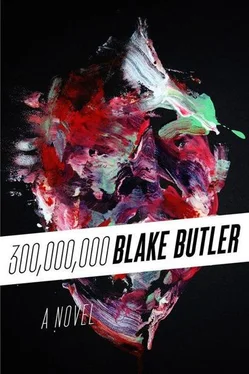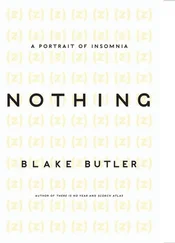Gravey stands before the courtroom, no attorney (having refused), his head aglow in flat light from the neon panels in the ceiling holding the natural light out. Seven of the twelve jurors seated in the box are wearing all black; three are wearing white; they look exhausted, taut of skin; the remaining two jurors are dressed in clothes they might have another morning worn to church. For each member of the jury an armed bailiff is located somewhere in the room, in addition to the extra battery of officers at each door and window, and surrounding the buildings. Through the walls it is so silent between speaking it is as if one can hear the sun. The local premises are being patrolled round the clock by helicopters, federal troopers, private hires, and overhead, remaining unseen. This trial will have no real beginning and no end. This is formality. The jurors speak in tongues. The judge speaks in tongues. The judge’s dying mother on the phone with the judge during lunch recess speaks in tongues. The D.A. speaks in tongues. The assistant to the D.A. speaks in tongues. The witnesses speak in tongues. The loud interlocutor whose daughter had been killed by Gravey and who has come to the courtroom wearing a mask over her face screaming suddenly amidst the silence for Gravey’s blood speaks in tongues. The other grieving speak in tongues. The press pundits speak in tongues. The windows do not speak. Gravey does not speak. It has not rained in thirty-seven days.
When not waiting in silence in the courtroom, Gravey stands all hours at the center of his cell. He will not sit or sleep or eat or speak or close his eyes. He finds his chest so thin it is translucent. His organs and orifices in the cold clear gel have neon colors, their edges bloating and retracting into plastic puzzle shapes: his spleen a circle; his gallbladder a square; his ureter hole a hexagon; his lungs a star; his pancreas a triangle; his rectum a diamond; his brain a ring. His blood is thin and turning clear. Among his flesh, he’s disappearing: his chest, his arms, his neck. He tries to summon from his memory a mirror, but there is nothing there like that at all, nothing beyond the ringing in his sternum, pages turning. Each time he thinks another sentence, the earth begins again around it.
FLOOD: Each time I try to call a name out, I can’t make my mouth open. Trying to remain silent, I hear the wind run through me where I am not. Everything I look at shows my reflection. And behind me: nothing .
There is very little room now left to breathe.
Each time he pushes up out of the dark liquid, Flood finds the walls of the chamber nearer, slicker. The surface tension of the wet is turning hard. The blood inside him also is stiffening, becoming heavy from his fingers to his head; he finds it hard to move his joints, or harder to want to. Behind his eyes is all the black.
He goes under into the wet again, again, spreading his arms out, looking, looking, that something from the darkness might emerge; another kind of light inside it, or a person, though he cannot remember who now, or perhaps a second darkness darker than the first, something he can move inside of, become filled by.
Marking each inhale reemerging, somewhere in the larger world far outside the chamber another several thousand people die, and therefore many several thousand other future people who would have come from them are now never born.
FLOOD: My body full of spit and blood. My mind full of holes leading to rooms full of the dead. Through the surfaces conferred their final concentration in the film containing all other film, upon which there is no rewind, no eject. A world awaiting .
Other tapes among the tapes of Gravey begin to reveal themselves as holding shapes. Hid in the white the act of the destruction of the family occurs again, again. Each tape begins in a new but similar location, with different sets of families, though it is difficult to remember one apart from any other by the end. There is the liquid. There is the child’s camera. In the rising wet, the people become drowned upon the presence of the man arriving at the center of the room, whose face is never shown. The blood will wash out of the bodies, raising it higher. The scene will end then, cutting out.
The tape could be rewound. The tapes could be played again, over and over, as long as there is someone there to operate their mechanism, to have the wish to.
The video is not proper evidence of Gravey as a killer, despite the resemblance of him from behind. Each time the camera faces the face, the film there ends, just at the instant one would see him seeing. The shape of the figure could be anybody, legally, from this angle, and so is anybody.
Anybody.
All who see the tape there for all days coming can recall only the white.
Today in America, 2,441,560 people become killed.
Moms and dads die, kids die, friends die, lifeguards die, road workers die, PhDs die, lieutenants die, the incarcerated die, all at the hands of those they know or have come near; they are ripped open and their innards are eaten from the hull of their unmaking; ushers die, singers die, strippers die, organ donors die; their organs are not used to fill other bodies with a new life; Golden State Warriors die, gypsies die, hitchhikers die, dentists die, dental assistants die at the hands of the dentists or the patients, the weight of the buildings rises during the night; screenprinters die, brothers die, creators die, the dying die, the wishmakers die, the wanting die, the laughter coming from their heads; the coffee erupting on the counters as the timers go off as planned, burning the surfaces with black liquid overflowing, never again; pet owners die, the pets will fend for themselves; bartenders die, alcoholics die, their bodies are not preserved; artisans die, matchmakers die, janitors die, game show employees die, the worshipped die, the worshipping die; the color of all sound; editors die, the planets spinning; the reader of the book; lamps die, Boy Scouts die, Girl Scout leaders die; the train arriving at the station comes in late; hearse drivers die, neuroscientists die, chemists die, programmers die, some of the people you went to high school with die, some of the people you saw years back at the mall, the people you bought gas from, the organ grinder, the descendents of him who delivered from her mother’s flesh your mom; the sentence makers die, the law writers die, the magicians die, the poets die, the blog commentators die, the violinists die; the fish sing in your ears; the blue of a wheelbarrow reflecting anything it comes near back toward itself; the first baseman dies, the pitcher dies, the catcher waits crouched at his knees, the balls over America at any hours descending in their numbers, the blacktop and the feed; camels die, bathroom attendants die, stockbrokers die, those who have no central occupation of creation or focus or hobby or forward motion in the name die; the shirts come off the bodies; the bodies are eaten into other bodies and become less bodies, all in one, each fed into the other in a becoming-final string of flesh entering flesh, while the newborn numbers descend further and the cells are counted as cells we have and may not ever have again, unless; the strongmen die, the bearded lady dies, the stuffers of the pillows and the folders of the cloth; the surgeons die, the plumbers die; the grass rising up around the homes; the angered die, screenwriters die, those who operate the phones, those who tear the tickets at the mouth of buildings, those who power walk; salesmen of vitamins and fine clothes and batteries and cars and furnaces and loft apartments and MacBook Pros and Fritos and divine ideas and pleasure purpose and sexual dementia and pressure washers and word processing software and eggs and cheese and tee shirts and cleaner cities and designers of the fur and wanters of the honey and those with gardens and those with eyeglasses and those against milk, those with rings around their fingers, those in horror, those who write infernal books, those who are infernal books themselves by merely walking with eyes open in the light, they die. Some of them kill themselves to miss the rest of this. Some go on. Machines go on and something else does, while in the hour of the Thrust, in singing minutes, hundreds of thousands hand to hand and face to face, they die. Justices die by swords in the hands of sculptors, Christians die by the hands of parking lot attendants under mist, whites die by the hands of priests and waitresses and students and the homeless and the living and the pearled with fists and jackhammers and darts and overdoses delivered by the tongue; the foreheads are bitten from the faces, swallowed; the fingernails are chipped off from the fingers, gnawed; the chest flesh is rendered from the sternum with an apparatus and taken into the self in part of self becoming and then taken off of those with scalpels or teeth themselves; witnesses are hung from rafters in a backyard of old Kentucky; cleaners are beaten in the face upon the face of I-295, the concrete alive with the putty of the blood congealing in the seemingly redoubled sun; cops are killed by fingertricks and sternum throttles and long blue swords and pikes and black magick by tricks and jerks and friends and royalty and cherry pickers and the rich; cops are made to choke on their own flesh and spit by the hands of the virgins and the lifeguards and the valorous and the unholy and the timid and the cancered and those who solicit money outside the mall; cops are chewed to bits by cats trained by warm-weather lovers in the streets outside the houses where the cops lived one year when they were young; cops are killed by cops; for thirty seconds over California the image of an aleph forms from clouds of discolored smoke, then blows away; all the stations in the world play the same commercial in the same instant without prior planning; goose eggs fall out of a tree; dog groomers are licked of skin by Holocaust survivors; godmothers are driven by the skull into a yellow wall in Minnesota; a pastry truck is overturned, found filled with lice; the oldest person in the country kills one hundred and forty-seven with a machine gun in Kansas City before she falls flat on the last face she’ll remember and is mauled to pieces by one librarian in the name of names, raising the name into the light, the name I can’t remember even in my own breath here to tell you because the name resounds no longer in a language and has passed into the soil, has felt to burrow in the money of the pit of the eye of eternal wishing and the parrot of the Sod, though we still do not know what the Sod is and will not know and will need to know or know. Those who remain in certain hours still find laughter about something and try to share it. There are tongues passed between friends’ lips. The cock might grow hard. The finger in the belly. Jewelry is sold. Machines turn off and on among the flowing platelets. “I will wear you unto my king.” “I will be the ground that you have walked on.” “Love me. Love me.” The pavement feels deranged. Butchers die, longshoremen die, blackjack dealers die, sidewalk salesman are ripped limb from limb by those who ten minutes prior had felt inside them a clean wish to buy a gift; gifts hidden in boxes in coming houses become forever hidden before the burning; those with the unbroken hymen die, those with the shirts with their own names printed or embroidered die, the same ten numbers repeat in shaking rosters again, again, the numbers eating through the paper in a room of no one watching, the palm trees growing ever nearer to the curb. The binders die, the mugged. Night comes again. Smoke rises in a harbor where ships stand for hours counting the surrounding mountains pouring wet like melting cones, and blue cones rise in the sinking fields of commerce from the lessening of trample on their face. Smoke rises from the gums of women. Smoke on the shorelines. Everybody knows a joke. The bodies smell like gravel, then like pig meat, then like glass. The sea thickening, where reflected, holding out beyond our minds, our Sod City we do not know in all cities, Our City of the Chewing of the Rolling Light of Gloss of Sod.
Читать дальше












